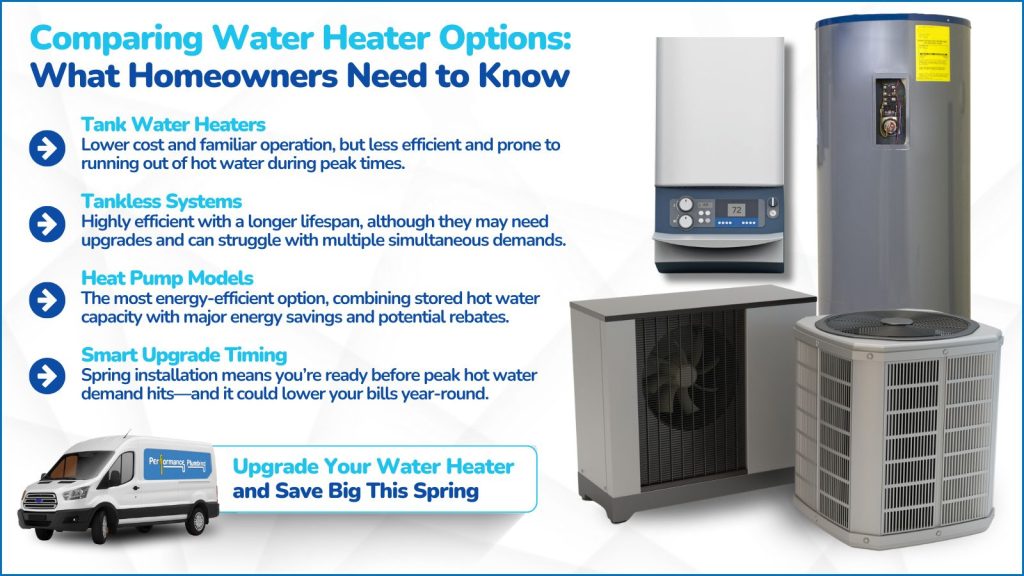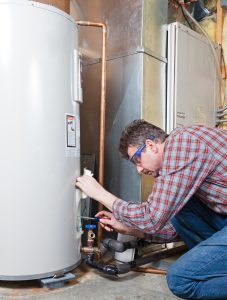As the saying goes, “April showers bring May flowers”—but what if those showers could also bring better energy efficiency, lower water heating costs, and consistent comfort in your home? If your current water heater is aging or struggling to keep up with your household’s hot water needs, spring is the perfect time to consider an upgrade.
Among the available options, the heat pump water heater is quickly gaining popularity for its efficiency and performance. But how does it compare to the more familiar tank and tankless water heaters? Let’s explore the differences to help you choose the best fit for your home.

Traditional Tank Water Heaters
Standard tank-style water heaters are still found in many homes across the country. These systems store a set amount of hot water—typically 40 to 80 gallons—and continuously heat it so it’s ready when you turn on the tap.
Pros:
- Lower upfront cost compared to other systems
- Simple installation
- Familiar technology and widespread availability
Cons:
- Standby heat loss (energy used to keep water hot 24/7)
- Limited hot water supply—may run out during high usage
- Shorter lifespan (typically 8–12 years)
- Higher monthly energy bills
Tank water heaters may work fine for small households or those with predictable usage patterns, but they lack the efficiency and flexibility of newer models.
Tankless Water Heaters
Also known as on-demand water heaters, tankless models heat water only when it’s needed, using either gas or electricity. Since there’s no storage tank, hot water is produced as it flows through the system.
Pros:
- Endless hot water supply
- More compact design—saves space
- Longer lifespan (15–20 years)
- Improved energy efficiency compared to tank systems
Cons:
- Higher upfront cost
- May require electrical or gas upgrades
- Limited flow rate—may struggle to serve multiple outlets at once
Tankless water heaters are ideal for households that want continuous hot water and are looking to reduce energy waste, but the installation costs and capacity limitations may not suit every family.
Heat Pump Water Heaters (Hybrid Systems)
A heat pump water heater works by pulling heat from the air around it and using that energy to heat water. Also referred to as hybrid systems, these water heaters combine a small electric resistance element with heat pump technology for maximum efficiency.
Pros:
- Uses up to 60% less energy than standard electric tank models
- Environmentally friendly with a lower carbon footprint
- Eligible for rebates, tax incentives, and energy efficiency programs
- Excellent for moderate to high hot water demand
- Long lifespan (10–15 years)
Cons:
- Higher upfront cost than standard systems
- Requires a space with adequate ventilation (not ideal for tight closets)
- Slower recovery time in cold environments
What makes a heat pump water heater unique is its ability to provide all the benefits of a tank system—plenty of stored hot water—while consuming significantly less electricity. It’s a great fit for environmentally conscious households looking for long-term savings.
Which System Is Right for You?
Choosing the right water heater depends on your household size, hot water usage, installation space, and energy efficiency goals.
- For budget-conscious homeowners: A traditional tank water heater may suffice, though it will cost more to run over time.
- For continuous hot water with limited space: A tankless unit offers an efficient, space-saving solution.
- For top energy savings and sustainability: A heat pump water heater delivers exceptional efficiency, lower energy bills, and may qualify for rebates that offset initial costs.
Upgrade Your April Showers—And Your Water Heater
Don’t let another season go by with an outdated or inefficient water heater. Whether you’re looking for better performance, more reliable hot water, or significant savings on your energy bill, upgrading to a heat pump water heater or exploring your best-fit system is a smart move this spring.
Contact us today to learn more about your water heater options and schedule your free estimate. Make this April the month you upgrade your showers—and your home comfort.
Contact Performance Plumbing today for plumbing services in St. Louis, MO today!

